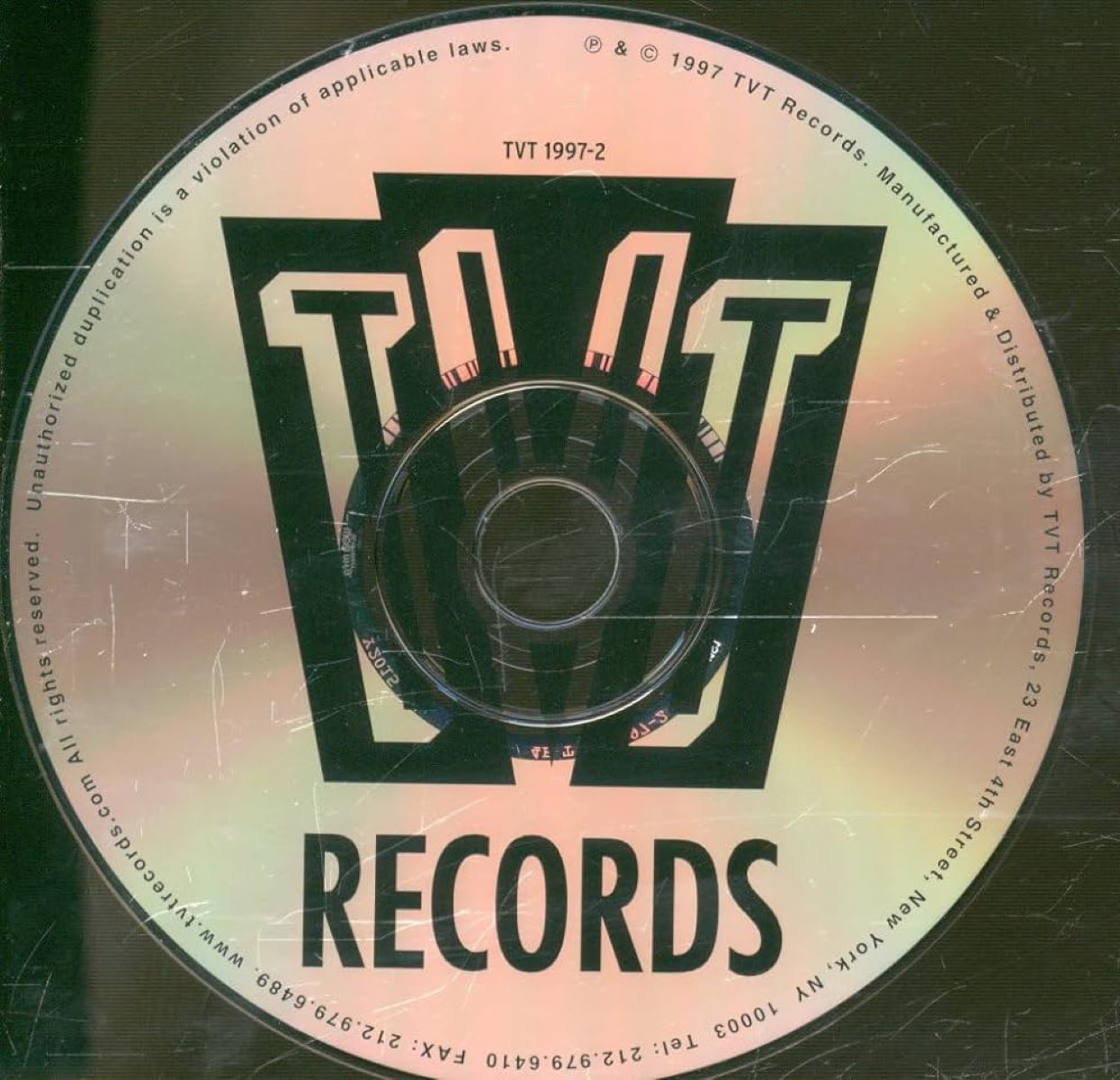Home>Production & Technology>Record Label>What West Coast Record Label Was Found By Suge Knight


Record Label
What West Coast Record Label Was Found By Suge Knight
Published: January 24, 2024
Discover the iconic West Coast record label founded by Suge Knight, a powerhouse in the music industry. Explore the groundbreaking achievements and influential artists associated with this legendary record label.
(Many of the links in this article redirect to a specific reviewed product. Your purchase of these products through affiliate links helps to generate commission for AudioLover.com, at no extra cost. Learn more)
Table of Contents
Introduction
When it comes to the evolution of hip hop music, record labels have played a crucial role in shaping the industry and promoting talented artists. One significant record label that made a profound impact on the West Coast hip hop scene is Death Row Records. Founded by Marion “Suge” Knight, this label became a powerhouse in the 1990s, introducing groundbreaking artists and creating a distinctive sound that would define an era.
As one of the most successful and controversial record labels in history, Death Row Records became synonymous with the West Coast rap movement. With Suge Knight at the helm, the label not only fostered the careers of iconic rappers but also became known for its opulent lifestyle, legal battles, and infamous feud with East Coast label Bad Boy Records.
This article will delve into the story of Death Row Records, tracing its origins, highlighting its successes and controversies, and examining the legal issues that ultimately led to its decline. We will explore the impact of this groundbreaking record label on the hip hop industry and its enduring legacy that still influences music today.
Early Life of Suge Knight
Marion “Suge” Knight, the mastermind behind the founding of Death Row Records, was born on April 19, 1965, in Compton, California. Growing up in a rough neighborhood known for its gang activity, Knight faced numerous challenges and was exposed to the realities of street life from an early age.
Despite the adversity he encountered, Knight excelled in football and went on to play college football at El Camino College and the University of Nevada, Las Vegas. Knight’s passion and talent for the sport were evident, and he even had a brief stint playing for the National Football League’s Los Angeles Rams in the mid-1980s.
However, Knight’s dreams of a professional football career were cut short due to an injury, redirecting his focus towards the music industry. In the late 1980s, Knight began working as a bodyguard for hip hop artists, showcasing his intimidating presence and protective nature.
It was during this time that Knight formed valuable connections and gained insight into the inner workings of the music industry. Drawing inspiration from the success and influence of prominent labels such as Motown Records and Def Jam, Knight realized the immense potential of starting his own record label.
With a vision to create a platform for West Coast artists and provide a voice for the underrepresented talent in his community, Knight began laying the groundwork for his own record label, which would eventually become known as Death Row Records.
The early life of Suge Knight serves as a testament to his resilience and determination to overcome obstacles. Through his experiences in football and his time as a bodyguard, Knight honed his business acumen and developed a keen understanding of the music industry’s dynamics. These early experiences would play a pivotal role in shaping his future endeavors and the success he would achieve with Death Row Records.
Founding of Death Row Records
The founding of Death Row Records marked a groundbreaking moment in the history of West Coast hip hop. In 1991, Marion “Suge” Knight, along with renowned producer Dr. Dre, established the label with a shared vision of creating a platform that would revolutionize the music industry.
Death Row Records quickly gained a reputation for its distinctive sound and for highlighting the gritty reality of life on the streets of Los Angeles. The label’s initial roster included prominent West Coast artists such as Dr. Dre, Snoop Dogg, and Tupac Shakur, who would go on to become some of the most iconic figures in hip hop.
Shortly after its founding, Death Row Records released its first album, “The Chronic,” produced by Dr. Dre. The album’s fusion of gangsta rap and G-funk became a commercial and critical success, propelling the label to prominence and establishing its signature sound. Songs like “Nuthin’ But a ‘G’ Thang” and “Let Me Ride” showcased Death Row Records’ ability to create catchy yet gritty tracks that resonated with listeners.
One of the defining moments in the label’s history came with the signing of Tupac Shakur in 1995. Tupac, a charismatic and politically charged rapper, brought a new dimension to Death Row Records and helped solidify its status as a dominant force in the industry. His albums, including “All Eyez on Me” and “The Don Killuminati: The 7 Day Theory,” showcased his raw talent and lyrical prowess, further enhancing Death Row’s reputation.
Furthermore, Death Row Records’ success was not limited to just the music. The label became renowned for its extravagant and controversial lifestyle, with Suge Knight flaunting his wealth and power. Lavish parties, luxury vehicles, and an entourage of bodyguards became synonymous with the Death Row brand, solidifying its image as a force to be reckoned with.
The establishment of Death Row Records was a turning point in the music industry, as it provided a platform for West Coast artists to express their experiences and challenge the dominance of their East Coast counterparts. With its unique blend of aggressive beats, thought-provoking lyrics, and captivating personalities, Death Row Records reshaped the landscape of hip hop and left an indelible mark on the genre.
Successes and Controversies of Death Row Records
Death Row Records enjoyed unprecedented success during its peak years in the 1990s. The label’s unique blend of West Coast gangsta rap and G-funk, coupled with the raw talent of its artists, propelled it to the forefront of the music industry. Death Row’s success can be attributed to its string of influential releases and the cultural impact it had on the hip hop scene at the time.
One of the label’s most significant successes came with the release of Dr. Dre’s debut solo album, “The Chronic,” in 1992. The album’s infectious beats and innovative production techniques garnered critical acclaim and commercial success, solidifying Death Row’s position as a dominant force in the industry. Songs like “Nuthin’ But a ‘G’ Thang” and “Dre Day” became instant classics and contributed to the album’s multi-platinum status.
Another monumental achievement for Death Row Records was the release of Tupac Shakur’s double album, “All Eyez on Me,” in 1996. The album showcased Tupac’s versatility as an artist and featured hit singles like “California Love” and “How Do U Want It.” “All Eyez on Me” became one of the best-selling rap albums of all time and further solidified Death Row’s status as a powerhouse label.
However, alongside its successes, Death Row Records was marred by controversies throughout its existence. One of the most notable incidents was the East Coast-West Coast rivalry that escalated between Death Row and the East Coast-based Bad Boy Records, led by Sean “Diddy” Combs. This feud intensified in the mid-1990s and resulted in several high-profile diss tracks being released, with tensions reaching their peak following the tragic deaths of Tupac Shakur and The Notorious B.I.G.
In addition to the East Coast-West Coast rivalry, Death Row Records faced accusations of promoting violence and criminal behavior in its music and business practices. The label’s notorious founder, Suge Knight, had a reputation for strong-arm tactics and alleged involvement in illegal activities. Numerous legal issues plagued Death Row, including Knight’s imprisonment on charges of assault and extortion.
Moreover, Death Row Records faced financial challenges and internal struggles that contributed to its eventual decline. The label struggled to maintain its momentum after the departure of key artists such as Dr. Dre and Tupac Shakur. Contract disputes and legal battles further hindered the label’s ability to sustain its success.
Despite its controversies and eventual decline, the impact of Death Row Records cannot be understated. The label’s trailblazing artists, groundbreaking releases, and cultural influence left an indelible mark on the hip hop industry. Death Row Records played a pivotal role in shaping the evolution of West Coast hip hop and remains a significant part of music history.
Legal Issues and Decline of Death Row Records
The success and impact of Death Row Records were overshadowed by a series of legal issues that ultimately contributed to its downfall. The label, already mired in controversies and feuds, faced a barrage of legal battles that took a toll on its operations and reputation.
One of the pivotal moments in Death Row’s decline was the incarceration of its founder, Marion “Suge” Knight. In 1996, Knight was sentenced to prison for violating parole and assault charges. His absence and legal troubles created a power vacuum within the label, leading to a loss of direction and instability.
Add to that, Death Row Records was hit with a wave of lawsuits from artists, producers, and former employees claiming unpaid royalties and breach of contract. These lawsuits resulted in significant financial setbacks for the label and tarnished its reputation within the industry.
Furthermore, the unresolved East Coast-West Coast rivalry between Death Row Records and Bad Boy Records continued to escalate, leading to further legal entanglements. Following the deaths of Tupac Shakur and The Notorious B.I.G., speculation arose about possible connections between the feuding labels and the tragic events. Though never conclusively proven, these allegations further contributed to Death Row’s negative public image.
As financial troubles mounted and the legal battles intensified, many of Death Row Records’ star artists began to distance themselves from the label. Dr. Dre departed in 1996 to start his own successful label, Aftermath Entertainment. Snoop Dogg followed suit in 1998 and signed with Master P’s No Limit Records. The departure of these key figures further weakened Death Row Records and eroded its influence in the industry.
In 2006, Death Row Records filed for bankruptcy, dealing a significant blow to its already faltering empire. This marked the official end of an era for the label that had once dominated the hip hop scene. The assets of the label were eventually sold to a Canadian company, effectively bringing an end to the Death Row Records legacy.
The legal issues and subsequent decline of Death Row Records serve as a cautionary tale in the music industry. The label’s tumultuous journey highlights the importance of ethical business practices, contract transparency, and maintaining positive relationships with artists and employees. Despite its demise, Death Row Records will be forever remembered for its impact on West Coast hip hop and its role in shaping the genre during its golden era.
Conclusion
Death Row Records, founded by Marion “Suge” Knight, emerged as a powerhouse in the world of hip hop, leaving an indelible mark on the West Coast rap scene. The label’s unique blend of gangsta rap and G-funk, coupled with the raw talent of its artists, reshaped the music industry and influenced the genre for years to come.
From its origins in Compton to its rise as a dominant force in the 1990s, Death Row Records captured the attention of audiences worldwide. The label’s success can be attributed to its roster of influential artists, including Dr. Dre, Snoop Dogg, and the iconic Tupac Shakur. Their ground-breaking albums and chart-topping hits propelled Death Row Records to the forefront of the industry, solidifying its legacy.
However, the road to success was not without challenges. Death Row Records faced numerous controversies, legal issues, and internal struggles that ultimately led to its decline. The East Coast-West Coast rivalry, legal battles, and the imprisonment of Suge Knight all took a toll on the label and eroded its influence.
Despite its eventual downfall, Death Row Records will forever be remembered for its contributions to the hip hop industry. The label not only introduced groundbreaking music but also encapsulated the spirit and raw energy of West Coast rap. Its impact on the genre was profound, defining an era and inspiring a new generation of artists.
Today, the legacy of Death Row Records lives on as a testament to the power of artistic expression and the influence of record labels. The label’s success and controversies serve as a reminder of the complexities and challenges within the music industry.
As we reflect on the rise and fall of Death Row Records, we recognize the vision and talent that went into creating the label. Its story reminds us of the transformative power of music and the ability of artists and record labels to shape culture. Though it may no longer exist in its original form, Death Row Records will forever hold a place in history as a trailblazer in the world of hip hop.











